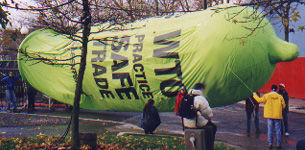

|
By: Alison M. and Alayne E., Port Moody, BC You watched the violent protests in Seattle in November 1999 on the news, saw the looting and angry people. But some of the people there were trying to make an important point. An estimated 70, 000 people protested the WTO Ministerial Summit last November in Seattle, Washington. A British Columbia organization, Check Your Head, had representatives at the protests. Charissa Chiu, a Check Your Head representative, said that "Youth usually only see one side of these situations, the mass media's side, we [Check Your Head] go out and give the other side." Mia Amir, also of Check Your Head, explained her need to be at the protests as being a "moral and ethical responsibility" and her resistance to corporate globalization. "Besides the whole political factor, it's [being there] also about how we change by becoming informed and educated." She believes the WTO is taking away democracy, and it is hard to see how she could feel otherwise.

January 1, 1995 saw the formation of the World Trade Organization. Though most people are familiar with this name, few actually know what how it will affect them. The WTO is an international body that regulates international trade and trade disputes, and is made up of 135 member countries, including Canada. Even this description has most people, wondering, "Why should I care?" As a citizen of this world, pretty much every trade decision made globally will affect you; and as organizations such as the WTO make the world of trade smaller and smaller, the effects become more drastic. How does the WTO impact on Canadians? The WTO is one of the forces which is making consumer goods cheaper. This sounds fairly positive, doesn't it? But, you need to look past the surface, short-term benefits and see how this is done. Instead of manufacturing products in Canada, where minimum wage can be as high as $7.50 per hour, the products are manufactured in places like China, where factory labourers do the work for often less than $7.50 per week. Yet many people still say, "Why should I care? Those people live millions of kilometers away, everyone there is poor, they are used to it." It's not true that it doesn't affect Canadians, in fact, these practices have huge impacts on Canadians. Thing about all the people in Canada who could have worked in those factories? They are out of jobs. Still not convinced the WTO's actions will affect you? In Canada, we have public health and welfare programs like universal health care and public schooling. But these types of programs may not survive the WTO. The WTO sees public funding of such programs as a "barrier" to companies from other countries who want to sell to Canadians. If the WTO had it's way, private corporations would be able to "compete" for "consumers" of health and education in Canada. Mega-corporations aren't getting their fair chance to squeeze money out the citizens of the world. The possibilities of what the WTO could do are endless: -open up Canadian water for mass export -end funding of cultural subsidies (which means that the fragile culture Canada has managed to save from the American cultural dominance could vanish altogether). -put an end to tariffs (tariffs give domestic products a chance to have comparable pricing and also help to control things like deforestation and the killing of endangered species by taxing foreign products as they enter the country) - disallow countries to deny trade with other countries (based on human rights records, environmental issues, etc.). For example, Massachusetts had a law that prevented government contracts from being given to companies doing business with Burma, because of Burma's horrible record on human rights. Under a WTO ruling, Massachusetts had to abandon this law. Think of this - as of October 1999, not a single democratically decided upon health or environmental regulation which was suggested as a trade barrier had remained in place. Not one. Here's two examples from the Council of Canadians website of what kinds of "trade barriers" are being removed: "Recently, for instance, the European Union was ordered to lift its ban on beef containing artificial hormones. The WTO ruled the ban, designed to protect public health, is an illegal barrier to trade. Even the powerful U.S. government was forced to withdraw provisions of its Clean Air Act when the WTO ruled that gasoline cleanliness standards Washington had set violated trade rules." These examples show another scary side to the WTO. The WTO has the authority to strike down laws and policies that are made by democratically elected governments. The WTO has the ability to back-up its decisions (made by an unelected panel of trade bureaucrats, in secret) with the threat of trade sanctions and fines &endash; to keep member countries toeing the line. At the heart of the protests against the WTO, is the protest against this threat to democracy. So, if we've convinced you just a little bit, and you want to inform yourself and take action as these activists have, contact Check Your Head at: cyh@axion.net Or contact these other associations
and find other websites. The Council of Canadians Vancouver Grassroots Alliance |